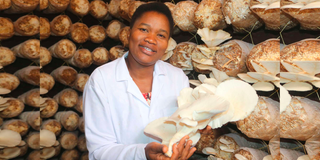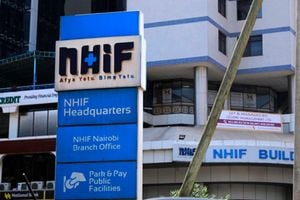How a family tragedy gave birth to mushroom venture

Consolata Njeri displays some of her mushrooms.
In the midst of a banana, maize and bean-dominated region is Consolata Njeri’s mushroom farm.
Villagers in Kairi, Gatundu, grow food and cash crops. Many are also into livestock farming.
The now thriving business is a child born in 2017, a year Njeri had almost lost hope.
It is the year Njeri conceived her third child. She had a rupture, which required bed rest for the rest of her pregnancy.
Then the unexpected happened. Her husband left.
“It was the time I needed him the most,” says the former embroidery work artist.
She used previously to design and make table cloths, curtains and duvets. The pregnancy rupture could not allow her to work.
Njeri had bills to settle. To make matters worse, her house in Kakamega was locked because of rent arrears.
Thanks to the Good Samaritan who came to her rescue, the room she was offered became a game-changer.
“I did online research and settled for mushroom business,” she says, adding that it was after she visited a farmer in Kakamega.
The mushroom is grown using locally sourced materials. It needs little space and fetches good returns, Njeri says.
The Certificate of Entrepreneurship holder had no source of income when she made the decision to grow mushrooms. The Sh1,800 she had been given by her mother became capital.
“I began with 200 bags. Unfortunately, moulds destroyed all my mushrooms,” recalls the farmer.
She sought refuge at her parents’ home in Gatundu, Kiambu County, where she revived the mushroom venture. Njeri’s has become a story of resilience and success.
The Connie Farm Fresh ‘N’ Organic Mushrooms owner supplies mushrooms to outlets across the country. She now works with a network of more than 50 farms.
Njeri has two mushroom houses for growing and fruiting.
“Phase One is for incubation, while Two for fruiting,” says Njeri, who grows the oyster variety.
Substrates or growing media used are dry banana fibres, maize stalks and combs, sawdust, wheat and rice straws.
They are cut into small pieces and soaked in drums of water, lime and molasses.
Dry sawdust is used to drain excess water from the substrates.
“They are then put in wheat bran or cotton seed cake as supplements, then mixed until well distributed,” she says.
“What follows is bagging. This involves compressing the substrates in small-sized polythene bags to make mushroom gardens.”
The gardens are then ready for steaming for two hours.
“Sterilising and inoculating the substrates at those stages is a must,” she says.
Incubation takes 28 days before they are transferred to the fruiting house.
The substrates are raised and monitored at room temperature of 22 to 26°C. The house should be dark and oxygen-free.
Njeri’s incubation house is made of iron sheets.
“Colonisation needs a high concentration of carbon dioxide. To achieve this, the bags and containers should be covered,” says Paul Kisiangani, a mushroom agribusiness consultant.
At Njeri’s muddy fruiting house, humidity is maintained at 85 to 95 per cent. She frequently waters the surface using a knapsack sprayer.
The equipment should never have been contaminated with chemicals.
The temperature here ranges from 18 to 20°C.
With the physical water shock, bodies known as primordia develop. Under good fruiting conditions, they form mushrooms that mature in three days.
The mushroom are ready for harvest when they unfold the caps. The two phases take about 40 days.
“For reproduction, we give farmers a budget. A two-kilo bag goes for Sh100, all costs included,” she says.
Njeri markets her produce through the Mushrooms Growers Association of Kenya and social media. She’s won tenders to supply mushrooms to supermarkets.
Her biggest clients are hotels and groceries, with a pack of 250g punnet going for Sh130 to Sh180.
Kisiangani advises mushroom consumption in Kenya is on an upward trend.





